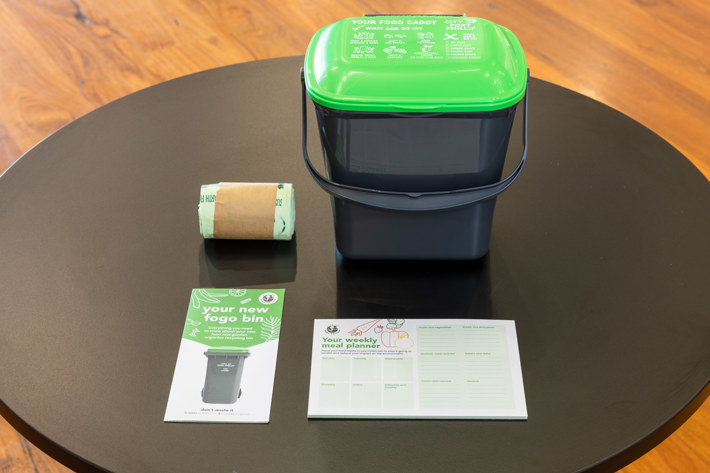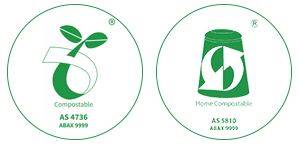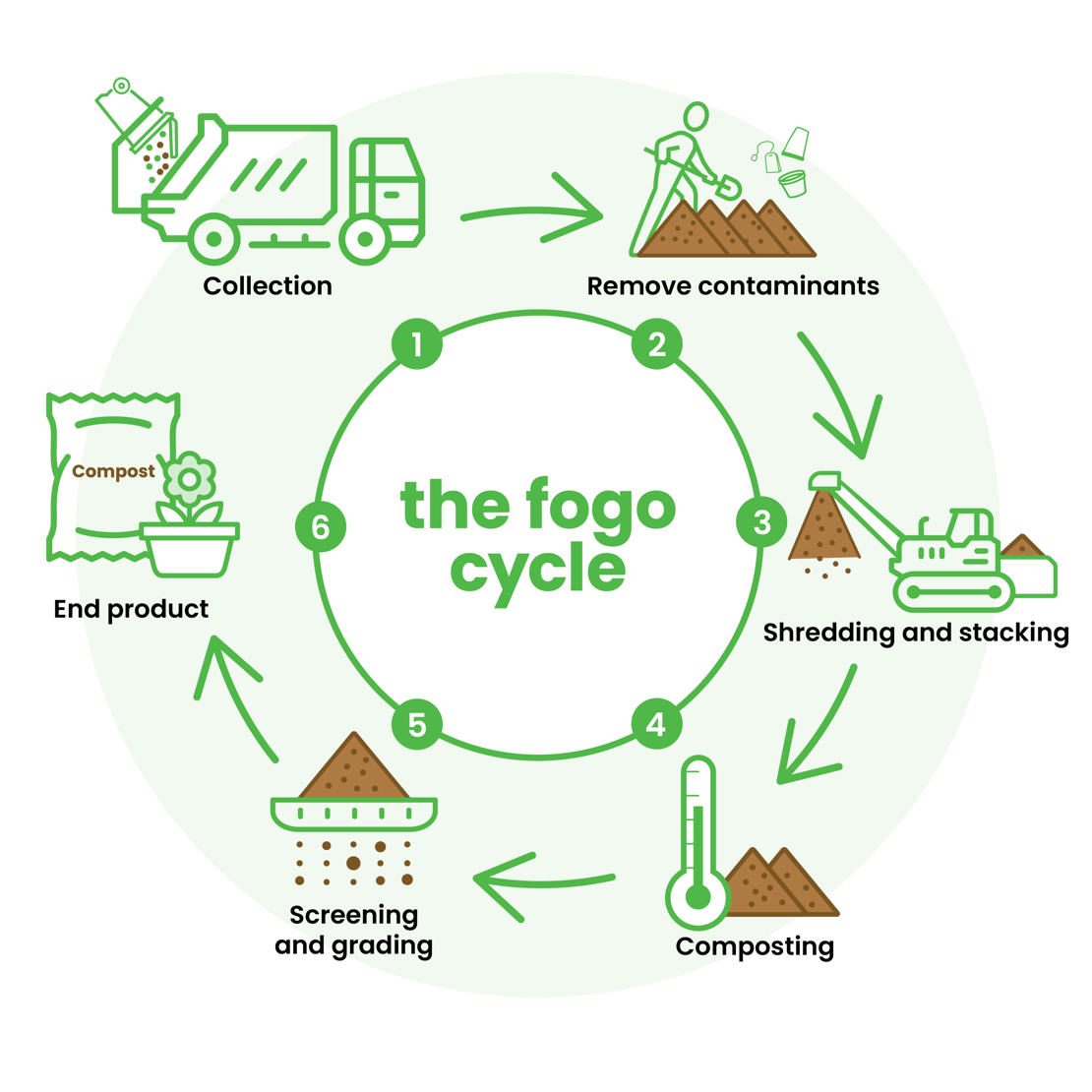Dispose of your Food and Garden Organics (FOGO)
We provide FOGO recycling services that ensure all households can divert their FOGO materials from the garbage stream. We do this in two ways:
- Properties with space for additional bins have a kerbside FOGO bin.
- Properties that don’t have the space can take their FOGO materials to their local communal FOGO hub, located throughout the municipality in local parks, reserves and other central community locations.
FOGO recycling is one part of our Don’t Waste It! Waste Management Strategy (2022-25).
Apartments and unit blocks
In February 2024 we completed the rollout of food and garden organics (FOGO) recycling to apartments and unit blocks on a Council waste service. This service is now running.
Residents in apartments who do not receive a Council waste collection are encouraged to use one of our 80 communal glass and FOGO hubs.
Kitchen caddies
We provided kitchen caddies to low-rise apartment blocks only (under 12 units). We couldn’t deliver caddies to medium and high-rise buildings due to access restrictions.
If you live in a larger apartment block and want a caddy, you can:
- request that caddies and liners be delivered to your building – ask your owners corporation or building manager
- collect a free kitchen caddy and roll of caddy liners from any of our five library branches.
If you are an owners corporation or building manager, you can download and print this FOGO recycling poster to place near your bins. You can also contact us if you would like us to provide you with a corflute version.
Kerbside collection schedule
FOGO bins are collected every week, on the same night as garbage and mixed recycling bins.

Caddy, liners and meal planner for collection
Kitchen Caddy and Liners
A free kitchen caddy (7L container with a lid) and one roll of caddy liners are available for collection to any household in Port Phillip that would like one.
Caddies can be collected from any of our five library branches: Albert Park, Emerald Hill, Middle Park, Port Melbourne and St Kilda. Due to storage constraints, we can only provide up to five caddies to individuals collecting them on behalf of other residents.
If you have accessibility requirements that prevent you from collecting a FOGO caddy please call us on 03 9209 6777 to discuss delivery options.
Compostable liners
You don't need to use liners to dispose of your food waste. However, if you would like to use caddy liners you must use lime green certified compostable liners (certified to AS 4736 or AS 5810). These can be purchased from most supermarkets, major hardware stores or from online retailers, for example:
Using non-certified compostable liners will result in your food waste being diverted to landfill as it cannot be composted.
Compostable logos
Look out for AS 4736 or AS 5810 logos for certified compostable liners.

Accepted
Food organics:
- fruit and vegetable scraps including citrus and onion
- meat and seafood
- bones - all types (cooked and raw)
- baked goods including bread, pastries
- grains and cereal
- mouldy and expired products
- loose tea leaves and coffee grounds.
Garden Organics
- grass clippings and weeds (free of soil)
- garden prunings
- leaves
Other items
- lime green compostable caddy liners (AS 4736 and AS 5810)
- small amounts of tissues, paper towel and shredded paper.
Don't include
- tea bags
- coffee pods
- pet waste and cat litter
- compostable food packaging
- liquids including cooking oil
- soft plastics and plastic bags
- soil
- rocks and pebbles
- plant pots
- hard shellfish shells
- rubber bands and string
- bamboo cutlery
- nappies.
Reducing your food waste
Food and garden waste makes up around 46 per cent of the waste our households send to landfill, and produces methane, a greenhouse gas that is approximately 21 times more potent than carbon dioxide. Reducing the amount of food waste we produce is an important step in helping our environment.
We recommend planning your meals and checking your fridge for existing groceries before your weekly shop to reduce food waste. To help you plan your meals we have created a meal planner and shopping list for you to use. Click here to download your meal planner and shopping list.
Apply to opt out of an allocated FOGO bin
We recognise that some apartments and unit blocks will not have the space to accommodate these new FOGO bins.
In this instance, Owners Corporation or Building Managers may request to opt-out of the service on behalf of the building. Please note that the following must be provided as part of the opt out request:
- a written letter of support from the Owners Corporation or equivalent supporting the request to opt out
- images of the bin room or storage area showing lack of space for additional FOGO bins.
Please contact ASSIST on 9209 6777 or use the opt out of FOGO button below.
Please note that due to a high number of enquiries there will be a delay in response time. Please keep your FOGO bin within your property until you receive a response.
Processing your FOGO – step by step

The FOGO Cycle
Food and organic waste goes through a 6-step process to become compost:
- Collection: FOGO materials are collected and taken to Repurpose It's Epping facility.
- Remove contamination: Contamination is hand-removed – things that shouldn’t be in the FOGO bin are taken out.
- Shredding and stacking: FOGO materials are shredded then stacked into long piles called windrows, which are kept moist and turned regularly for 16 to 20 weeks.
- Composting: These materials are composted at 50 to 70 degrees to destroy weeds and pathogens. Lab testing ensures the compost complies with standards.
- Screening and grading: The composted FOGO is screened into required sizes. Different grades of compost are required for different applications.
- End product: Your processed FOGO is ready for use! This compost is full of nutrients and used to rehabilitate land throughout Victoria.